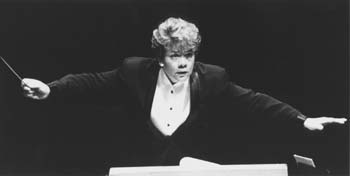![[MetroActive Music]](/music/gifs/music468.gif)
[ Music Index | Santa Cruz Week | MetroActive Central | Archives ]
Day of Deus
On Cue: Marin Alsop, music director of the Cabrillo Music Festival, conducted two stunning programs for the festival's opening weekend.
Marin Alsop leads performers and audiences alike through a moving 'Mass'
By Scott MacClelland
IN THE SCALE of ordinary life, Leonard Bernstein's Mass might be described as grandiloquent. While that word is rarely used as a compliment, Bernstein gives us little choice but to consider it that way. Like French opera in the 17th century, Mass contains just about everything but the kitchen evier. If you missed the Cabrillo Music Festival production last weekend in Santa Cruz, then try to wrap your mind around the following: war protesters, letters from jail, three discrete choirs, prerecorded audiotape, a dance troupe, hippies, the Roman Catholic mass, a parade, a symphony orchestra with rock and blues combos, the joys of debauchery, and praise for God.
Somehow, conductor Marin Alsop, the orchestra and choruses, "street" singers, dancers and supernumeraries held the attention of a sold-out Santa Cruz Civic Auditorium audience for an hour and three quarters, without a break. No one could leave. Those who may have wanted to found themselves preoccupied with trying to figure out what Bernstein's Mass is all about.
With his eclectic goal of reconciling the temporal and the eternal, the profane and the sacred, fear and faith, Bernstein turned to his artistic roots in American musical theater. No wonder, then, that Mass so often sounds like West Side Story, Chichester Psalms, the Kaddish Symphony and even Trouble in Tahiti. Composed in memory of John F. Kennedy, Mass is never less than a vivid self-portrait.
To confer unity on his magnum opus, Bernstein embraces the architecture of the Roman mass. The celebrant of the mass, who serves as anchorman, also gives voice to his own hopes, doubts and fears, chiefly in his "Simple Song" lauding God and his collapse into disillusionment upon the fracture of the host. For this crucial role, Alsop engaged Douglas Webster, a seasoned Broadway actor/singer, who also directed the room-filling performance.
Alsop wielded an 80-piece orchestra, 54-voice choir (assembled and prepared by Milton Williams), the 17 street singers (solos and ensemble), 14-voice children's chorus (directed by Cheryl Anderson) and 10 dancers (choreographed by Gary Masters). Principal flute Sheryl Henze took the lion's share of standout solos. The rock instruments in the orchestra, guitars and bass, were too soft to achieve the presence and color impact Bernstein intended. Other exotic orchestral colors were similarly lost in the cavernous room and overall whirl of activity.
Those who found themselves sucked into measuring Mass against other grand-scale musical endeavors from the classical tradition were likely disappointed. Regardless, Mass at once breaks new ground and sums up a brilliant career. The spectacle and music effectively underscore one another.
On Sunday, Aug. 8, Alsop conducted Steve Reich's Three Movements, Aaron Copland's Connotations for Orchestra, John Adams' The Chairman Dances and Christopher Rouse's Flute Concerto. What these pieces have in common is a high order of orchestral pizazz. For Reich this is a must. Since his music chugs along like a sewing machine, the burden of interest falls to his minimally shifting colors. In working out its 12-tone row, the Copland's colors bristled dissonantly and ultimately rose to a dramatic and powerful finale that sent shudders through Civic Auditorium.
The Adams, now a concert staple, imitated the Reich vocabulary of procedures but, under Alsop's urging, did it with considerable wit and twinkle. Rouse's concerto was written for Carol Wincenc, the soloist in this performance. The attractive work frankly embraces Celtic and ersatz Edwardian tunefulness, alternating tender sentiments with virtuosic animation. The third movement raises its elegies up to the point of a violent outburst, which gives the piece its explosive climax. The orchestra warmed into it generously, the strings imparting a deeply rich sonority.
[ San Jose | MetroActive Central | Archives ]
Copyright © 1999 Metro Publishing Inc. MetroActive is affiliated with the Boulevards Network.
For more information about the San Jose/Silicon Valley area, visit sanjose.com.
![]()

Catherine Byrd
The Cabrillo Music Festival continues with programs 8pm Saturday at the Santa Cruz Civic Auditorium, 307 Church St., Santa Cruz and 4 and 8pm Sunday at Mission San Juan Bautista. (420-5260)
From the August 11-18, 1999 issue of Metro, Silicon Valley's Weekly Newspaper.